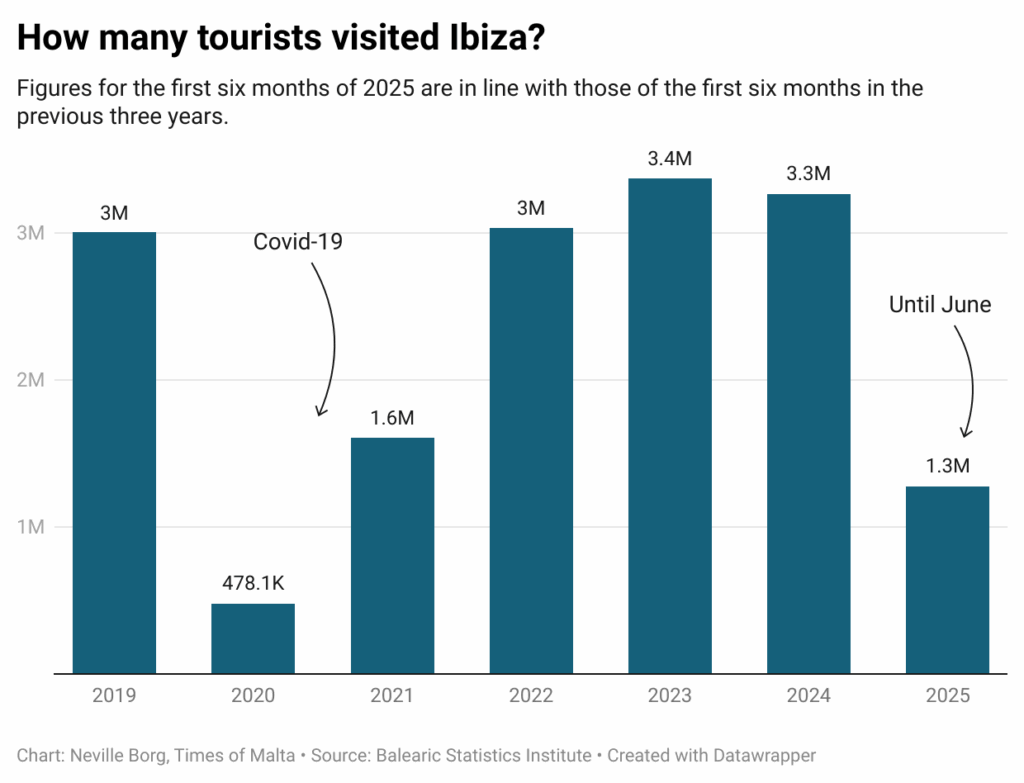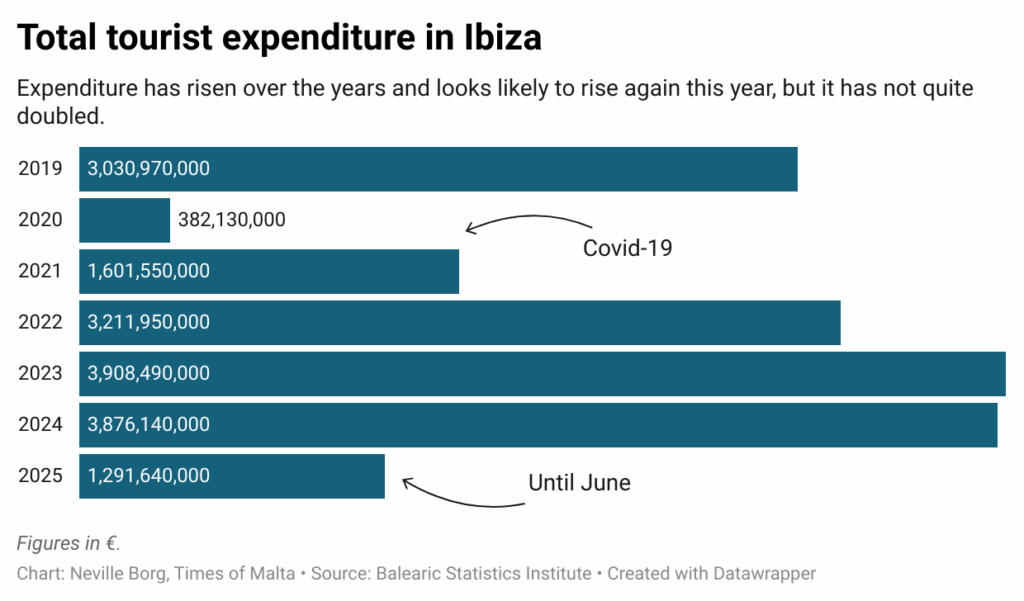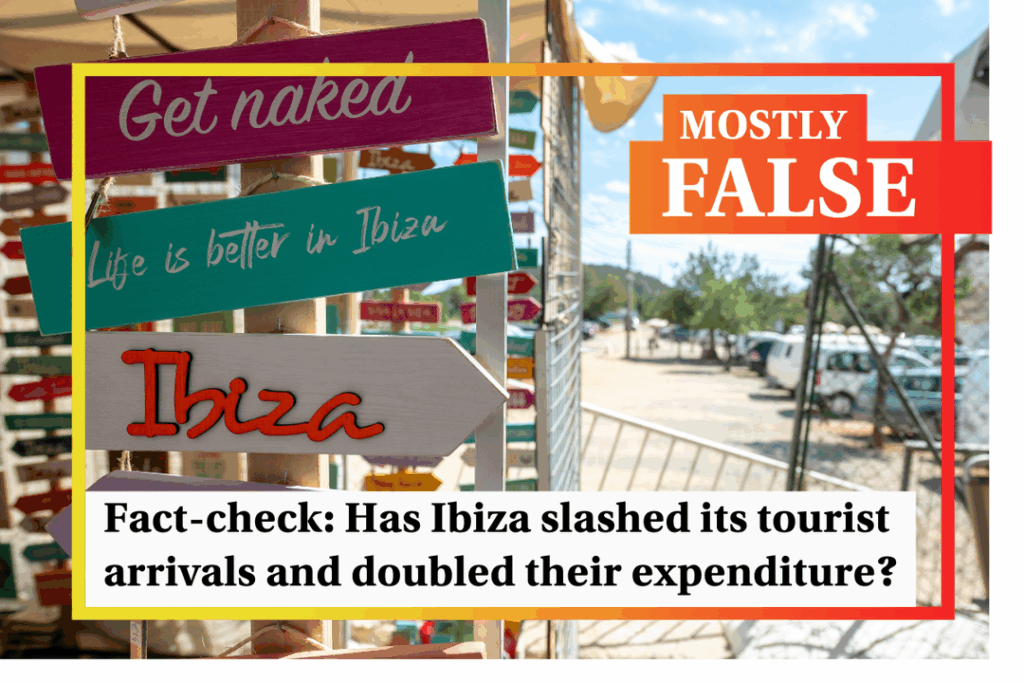Claim: Ibiza managed to slash tourist arrivals in half while doubling tourist expenditure after changing its image as a party island.
Verdict: Tourist arrivals in Ibiza have grown steadily throughout the past decade and remained stable since 2022. During this time, tourist expenditure has risen by around a third.
In the early weeks of his tenure, newly-elected opposition leader Alex Borg has frequently voiced his concerns over Malta’s tourism sector, warning that the country’s infrastructure and wellbeing is creaking under the weight of ever-growing tourist arrivals.
The topic has featured in several of Borg’s speeches and media appearances, including a radio interview on Radju Malta show Vi jew Va on September 13, as well as public meeting in the village of Qormi on September 28.
In both instances, Borg argued that Malta’s tourism authorities should shift their focus away from marketing Malta as a party island and towards areas such as gastronomy and culture, in order to bring in fewer, but more high-spending tourists.
Borg argued that Malta should look to model itself on Ibiza, which tackled its own overtourism woes by rebranding its tourist offering.
“Ten years ago, Ibiza was a party island like we are today, with chaos in the streets, vandalism and drugs,” Borg told presenter Albert Gauci Cunningham.
“Ibiza decided to revise its marketing campaign and cut tourist arrivals by half. Today it has half the tourists it had 10 years ago but double the income.”
Two weeks later, Borg repeated this claim, although the timeline shifted slightly, from a decade ago to as recently as two years ago.
He told supporters in Qormi that “around two or two and a half years ago,” authorities in Ibiza decided to change their approach and start marketing the island as a high-quality destination.
“Today they have half the number of tourists compared to two and a half or three years ago, but the tourists that visit leave twice as much money in Ibiza’s businesses,” he said.
While Borg is right to bring up Ibiza’s attempts to shed its raucous image, his claim that the island has slashed its tourist arrivals while upping tourist expenditure is inaccurate.

Has Ibiza slashed its tourist arrivals?
Like Malta, Ibiza’s woes with overtourism are well-documented, with resident groups calling for more stringent limits on the number of arrivals and stricter enforcement on rowdy tourists. Meanwhile, the island is trying to change its reputation as a clubbing mecca by pushing for more sustainable tourism.
However, official data from the Balearic Statistics Institute, the island’s official statistics body, suggests that this move has yet to fully leave its mark.
Far from being slashed in half, as Borg claimed, the data shows that Ibiza’s tourist arrivals have remained steady in recent years.
While 2024’s 3.26 million tourist arrivals were a slight dip from the previous year’s 3.37 million, it was higher than both 2022 and 2019, the last full year before the pandemic wreaked havoc on international travel.
Figures for the first six months of 2025 show that a little under 1.3 million people visited Ibiza so far this year, almost identical to the numbers during the same period over the previous two years.

Data on tourist arrivals before 2019 is more difficult to get hold of, with statistics often bundling arrivals to other Balearic Islands (particularly Formentera) together with those of Ibiza.
However, annual reports published by Balearic tourism authorities do provide some insight into tourist arrivals throughout the past decade.
The tourism authority’s figures differ slightly from those of the official statistics office, since they look at broader passenger arrivals, not just tourists.
Nevertheless, the figures reveal the same pattern – passenger arrivals to Ibiza have risen steadily from 3.2 million in 2015, settling at around 4.5 million over the past two years, only experiencing dips during the pandemic.
Are tourists spending twice as much?
Not quite, although there has been an increase in tourist expenditure over the years.
The Balearic statistics office told Times of Malta that tourists to Ibiza each spent an average of roughly €1,000 in 2019, with each tourist spending around €150 per day. By 2024, each tourist was spending €1,178 during their holiday, or almost €187 each day.
In total, tourists contributed €3 billion to Ibiza’s economy in 2019. By 2024, this had risen by a third, to almost €3.9 billion.
Data for the first half of this year suggests that this is likely to rise again in 2025, if only slightly.

Where did this claim of a drop in arrivals originate?
Borg is not the only person to have claimed that tourists to Ibiza have halved, with some international media reports making similar claims in recent months.
Electronic music news website EDM Tunes reported in May that Ibiza was experiencing a 56% decrease in travel this year, pointing to research by an unnamed luxury yacht charter firm.
Similarly, UK tabloid the Daily Express reported the same figure, citing a study by luxury yacht company 212 Yachts.
However, this study tracks online searches for Ibiza holidays, not actual tourist arrivals. Whether a drop in Google searches for Ibiza holidays will translate into fewer tourists landing in Ibiza remains to be seen.
Verdict
Like Malta, Ibiza is attempting to shed its party island image to focus on other tourist niches.
However, this has not yet translated into lower tourist numbers.
Tourist arrivals in Ibiza have grown steadily throughout the past decade before dipping sharply when the pandemic hit. Since 2022, tourists have flocked back to Ibiza, with arrival numbers remaining stable over the past three years.
Some international media reports speaking of a 56% drop in travel are based on a study which tracks online searches for holidays in Ibiza, not actual tourist arrivals.
While arrivals have remained steady, it is true that tourists have started spending more during their holiday in recent years, albeit not to the extent that Borg claimed.
Tourist expenditure has risen by roughly a third, with tourism bringing €3.9 billion to Ibiza’s economy last year.
The claim is therefore mostly false as the evidence generally refutes the claim, although some minor aspects of the claim may be accurate.
The Times of Malta fact-checking service forms part of the Mediterranean Digital Media Observatory (MedDMO) and the European Digital Media Observatory (EDMO), an independent observatory with hubs across all 27 EU member states that is funded by the EU’s Digital Europe programme. Fact-checks are based on our code of principles.
Let us know what you would like us to fact-check, understand our ratings system or see our answers to Frequently Asked Questions about the service.





